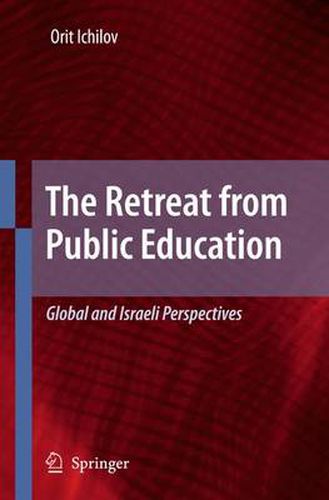Readings Newsletter
Become a Readings Member to make your shopping experience even easier.
Sign in or sign up for free!
You’re not far away from qualifying for FREE standard shipping within Australia
You’ve qualified for FREE standard shipping within Australia
The cart is loading…






This title is printed to order. This book may have been self-published. If so, we cannot guarantee the quality of the content. In the main most books will have gone through the editing process however some may not. We therefore suggest that you be aware of this before ordering this book. If in doubt check either the author or publisher’s details as we are unable to accept any returns unless they are faulty. Please contact us if you have any questions.
In recent decades the pendulum is swinging away from the idea and ideals of public education, and a new ethos increasingly takes over the shrinking public space of education. In the 1980s markets were elevated to social and economic icons, becoming a new secular faith. Privatizing public education became a credible policy in many countries and there have been an increasing number of attempts to restructure and deregulate state schooling. Global trade agreements foster domestic and international trade in education services treating education as a commodity to be sold and purchased, and many countries adopt various forms of market-related practices in education. These are not neutral, technical, managerial changes in the production and delivery of public education. They transform education in ways that have profound social and edu- tional consequences. To justify the introduction of market reforms in education public schools and educators are being defamed and accused of a series of vices, such as inef?ciency and laziness. We must be reminded that public education, i. e. , mandatory publicly ?nanced schooling, that was introduced in Austria as early as in 1874 and spread to other countries, was considered the most progressive movement of the nineteenth and twentieth centuries. Public schools were established to make education univ- sally available to all children, free of charge, and have been recognized as gateways to opportunity (Kober, 2006).
$9.00 standard shipping within Australia
FREE standard shipping within Australia for orders over $100.00
Express & International shipping calculated at checkout
This title is printed to order. This book may have been self-published. If so, we cannot guarantee the quality of the content. In the main most books will have gone through the editing process however some may not. We therefore suggest that you be aware of this before ordering this book. If in doubt check either the author or publisher’s details as we are unable to accept any returns unless they are faulty. Please contact us if you have any questions.
In recent decades the pendulum is swinging away from the idea and ideals of public education, and a new ethos increasingly takes over the shrinking public space of education. In the 1980s markets were elevated to social and economic icons, becoming a new secular faith. Privatizing public education became a credible policy in many countries and there have been an increasing number of attempts to restructure and deregulate state schooling. Global trade agreements foster domestic and international trade in education services treating education as a commodity to be sold and purchased, and many countries adopt various forms of market-related practices in education. These are not neutral, technical, managerial changes in the production and delivery of public education. They transform education in ways that have profound social and edu- tional consequences. To justify the introduction of market reforms in education public schools and educators are being defamed and accused of a series of vices, such as inef?ciency and laziness. We must be reminded that public education, i. e. , mandatory publicly ?nanced schooling, that was introduced in Austria as early as in 1874 and spread to other countries, was considered the most progressive movement of the nineteenth and twentieth centuries. Public schools were established to make education univ- sally available to all children, free of charge, and have been recognized as gateways to opportunity (Kober, 2006).